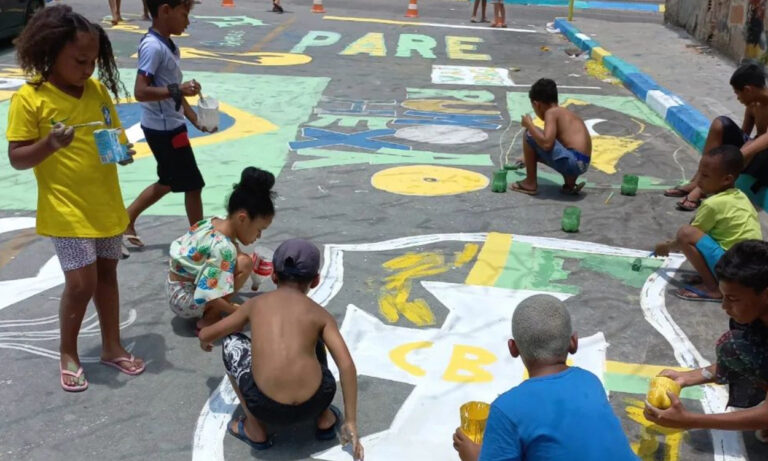How street artist Júlio Fessô is redefining murals as Brazil’s new form of political activism
Early November 2022, I came across a video of a young boy running up a set of stairs in an alley filled with flags and steps that had been painted in hues of blue, green, and yellow. It was the most artistic display of patriotism I had ever witnessed, and I found myself humming along to the sounds of funk. Instinctively, I knew I had been teleported to the largest country in South America but it wasn’t until the seventh watch that I noticed the individual responsible for this street art tucked away in a corner, a paintbrush in hand.
Meet Júlio Fessô, who, having grown up in the Morro Do Papagaio Brazilian favela—which spanned a population of approximately 17,000 people—remembers beautiful mural paintings on the walls and communal parties to celebrate important dates as an everyday occurrence.
Although it has become a ritual, years ago, if a firework was lit, someone from the adjacent neighbourhood (typically of upper-class status) would often mistake the crackling noise for gunshots and end up calling the police and signalling the press. So, in 2013, Fessô decided to take back control and start ‘Eu Amo Minha Quebrada’, a community group with the objective of actively showcasing their world in a positive light.
Speaking with SCREENSHOT, Fessô explained that the name translates to ‘I love my hood’. “It’s all about belonging and loving where you live, regardless of what the media says about it.” Having been raised in one of the largest favelas in Belo Horizonte, Fessô faced a number of challenges and adversities.
“When I turned 17, I got involved with crack cocaine—after a friend introduced me to it—and I ended up getting addicted.” His addiction resulted in almost nine years in prison, but it eventually led him down a different path and he came out of it having found hope in Christianity. “The moment I left, I thought about changing the reality inside my community,” Fessô shared.
At the time of our conversation, Brazil hadn’t yet faced Croatia at the 2022 Qatar World Cup and so there were still hopes for football victory reverberating throughout Rio de Janeiro. The streets of the former capital covered in art and images were circulating the internet, showcasing the vibrancy of the city.
Of course, for the natives, the art held deeper significance. Eight years ago, Brazil hosted the FIFA World Cup and amid the buzz of all the pre-excitement, street artists took to the city walls with spray cans and paint to display positive support for their home team. However, as with any art form, the murals always offered some the opportunity to tell a far more significant story. One such example was a painting by the artist Paulo Ito of a weeping, starving Afro-Brazilian child with nothing to eat but a football.
“The murals are why the project gained visibility this year,” Fessô explained, “but we’ve always painted the favela in times of World Cup.” And with the art’s growing popularity came an influx of volunteers, armed with paintbrushes and keen to transform how their community was perceived.
Together, they coated the entirety of the neighbourhood in durable paint, tagging their Instagram as they went in the hopes that passing cars would be forced to take notice.
The art form that was once an act of vandalism now thrives in the country. Some credit the likes of muralist Eduardo Kobra for trailblazing and forcing the mayor’s office into launching an online platform called Street Art Museum 360 in 2020, which catalogues and maps more than 90 murals of the city.
When we spoke to Fessô, it had been raining for a week, which meant his electricity was irregular. For him, the impact of murals goes beyond artistry—it stems from political decisions. In fact, even the choice to paint using the colours yellow and green (which have been co-opted by far-right former president Jair Bolsonaro) was an act of resilience, admiration, and rebellion.
“We felt oppressed by the colours and didn’t want to seem like we were supporting the government or the political group behind it, but by taking it back, we reinstalled our pride and that felt special,” he said. On the surface, this might sound like just a community project, but for the artist, it’s his livelihood and contribution to society. And what started with just a collective celebration has now sprouted into different avenues of campaigning.
During the COVID-19 pandemic, armed with a handful of volunteers, Fessô opened a small tent and gave out masks and alcoholic disinfectant around the entrances and exits of the favela to help protect his community. “The government [was] more worried about dealing with COVID in the noble areas and dismissed residents in favelas,” he told SCREENSHOT.
Yet, shortly after, Morro do Papagaio became the first favela to raise money to test a project with doctors, nurses, and psychologists. Alongside this, residents made a pact to only buy resources such as gas, electricity, and other essentials from local businesses within their community. “It was our way of building our own economy,” Fessô explained. After hearing about the initiative’s success, the Governor of Minas Gerais, Romeu Zema, decided to introduce similar methods to other favelas across the city.
Since then, the community has only grown from strength to strength. Just this year, members joined forces with the non-governmental organisation Greenpeace Belo Horizonte to paint environment and nature-inspired murals that not only educate locals about the effects of climate change but tackle misinformation surrounding it.
“Our communities have a lot of potential but lack incentives and leadership. Opportunities do not exist for everyone—in some places, we still need to build a bridge for people to have access to the chances, and I’m willing to do the work for it,” Fessô concluded.





